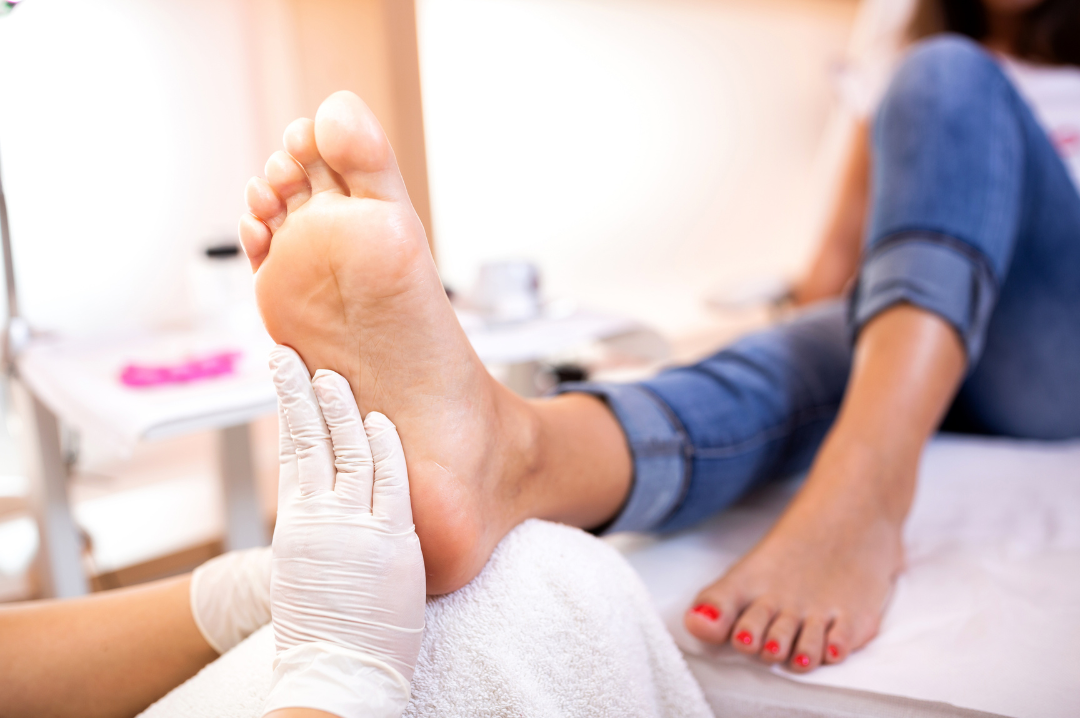blog
How Can I Prevent And Treat Foot Odour?
March 7, 2023

You call it having smelly or stinky feet, we call it bromodosis. Unpleasant foot odour is a relatively common, albeit often embarrassing, problem that affects approximately one in five people. It occurs when sweat and bacteria accumulate on the feet, creating an unpleasant odour. While foot odour is not usually a serious medical condition given that it often poses little threat to a person’s overall health and wellbeing, it can definitely make people feel self-conscious. The good news is that there are several ways to prevent and treat foot odour that often require little effort and can be done at home. Here’s a few things you can start with.
Dry Your Feet Well After Every Shower
Drying your feet well after every shower, bath and any time you get wet – like after swimming – is an essential part of helping to prevent ongoing foot odour. This is because moisture creates a favourable environment for bacteria to grow, which is the leading cause of foot odour. When your feet are damp or wet, bacteria can easily multiply.
By drying your feet thoroughly after every shower or bath, you can help remove excess moisture, which can limit the growth of bacteria. It is especially important to dry between your toes, as this is an area where moisture easily becomes trapped, particularly if you have hammertoes, claw toes, bunions or other foot problems which keeps the toes close together.
Wear Breathable Shoes And Socks
When your feet are enclosed in tight, non-breathable footwear, such as plastic or rubber shoes, they easily become moist and warm, creating a favourable environment for the growth of bacteria and fungi. These microorganisms thrive in warm and moist conditions, leading to smells developing.
Breathable shoes and socks, on the other hand, allow air to circulate around your feet, helping to keep them dry and cool. This makes it difficult for bacteria and fungi to grow, reducing the likelihood of foot odour. Materials such as leather and canvas are excellent choices for shoes, as they are naturally breathable and allow air to circulate around the feet. Socks made of natural materials such as cotton or wool are also good choices, as they can absorb moisture and allow air to circulate around the feet.
Switch Between Different Pairs Of Shoes
Rotating your shoes allows your shoes to dry out completely between wears. Moisture is one of the main causes of foot odour, as it creates an ideal environment for bacteria and fungi to grow. When you wear the same pair of shoes every day, they may not have enough time to dry out completely, allowing bacteria and fungi to multiply. As an aside, when shoes are worn moist, they also wear out faster.
By rotating your shoes, you can give them time to dry out completely, reducing the likelihood of bacterial and fungal growth. This is especially important if you sweat excessively or live in a humid environment, as your shoes may become damp more easily. Plus, you can also help prolong the lifespan of your shoes.
If You Have A Known Fungal Or Bacterial Foot Infection, Treat It
Given that the causes of foot odour are bacterial and fungal foot infections, treating existing infections can help solve a lot of the foot odour problem. Bacterial and fungal nail infections occur when bacteria or fungi invade the nail bed and nail plate. They can cause a range of symptoms, including thickened, discoloured, and brittle nails, as well as an unpleasant odour. These infections can also spread to the surrounding skin, causing additional symptoms such as redness, swelling, and itching.
To treat bacterial or fungal nail infections, antifungal medications, topical antibacterials, or a combination of both may be used. This is something that should be discussed with your podiatrist or doctor, as your specific treatment plan will depend on the severity of the infection and your medical history. It should be noted that some smells may persist even after fungus and bacteria have been eliminated, as other factors such as sweating and poor hygiene can also both contribute to foot odour.
Wash Your Insoles
Periodically washing your shoe liners, if they’re removable, may also help. If you have orthotics, these can also be cleaned – just make sure to follow the instructions from your podiatrist carefully and ensure they are completely dry before putting them back in your shoe.
See A Podiatrist
While home remedies including the suggestions above can go a long way in treating fungal nail infections, if they’re not working for you, it may be time to see a podiatrist. Your podiatrist will evaluate your feet, understand the cause of the persistent odour and why it’s not responding to other treatment options, and recommend stronger treatments, such as prescription-strength antiperspirants or topical medications.
If you’re struggling with foot odour and need help, book your appointment by calling us on 09 523 2333 or book online here.

